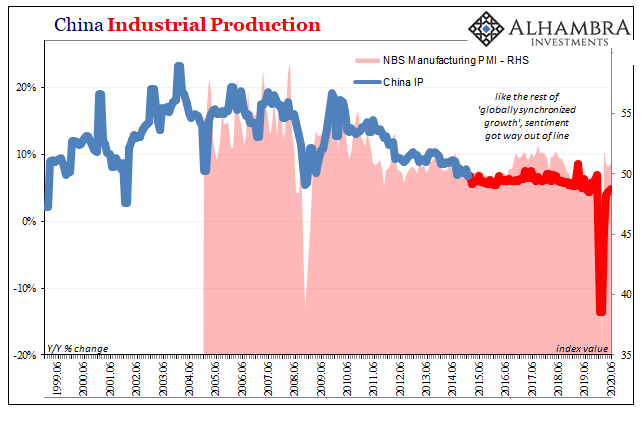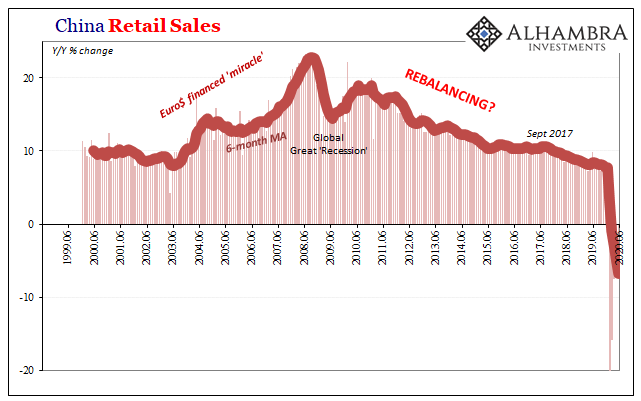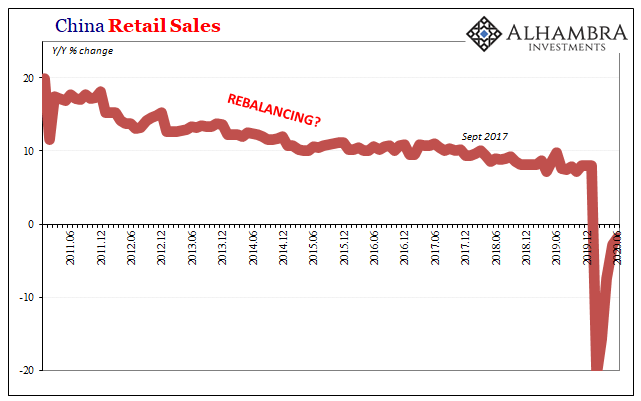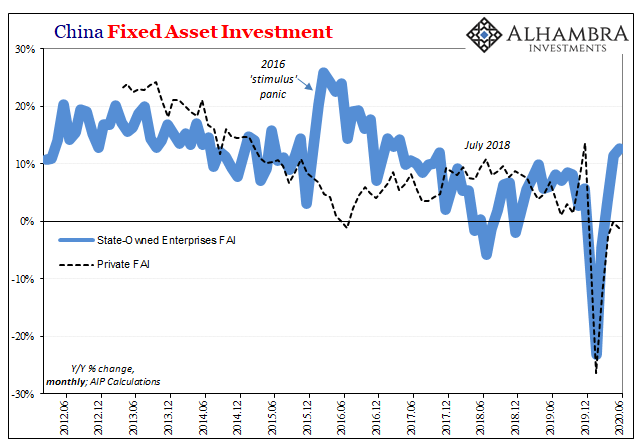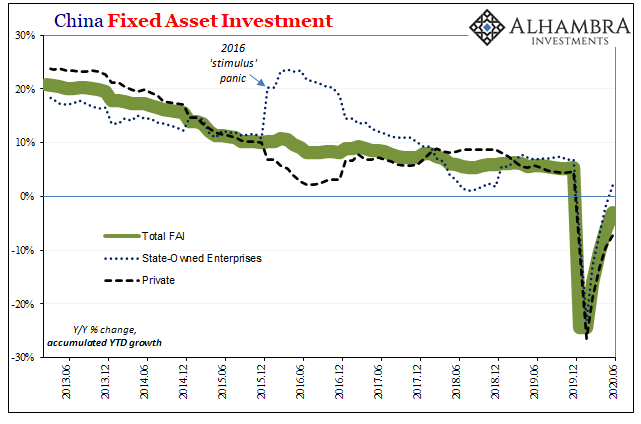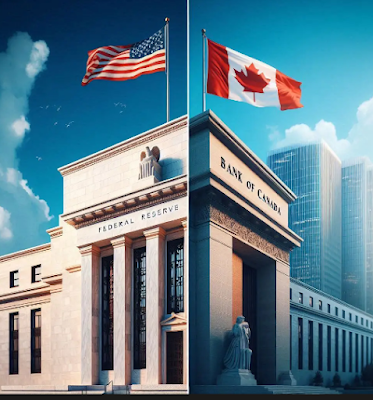At the monthly press conference China’s National Bureau of Statistics (NBS) now regularly gives whenever the Big Three economic accounts are updated (this time along with quarterly GDP), spokesman Liu Aihua was asked by a reporter from Reuters to comment on how the global economic recession might impact the Communist government’s long range goal of reaching its assigned GDP target. Liu started by saying that much of it was already done, anecdotally at least.
Since the reform and opening up, our understanding of comprehensive well-off has been continuously enriched.
The problem of food and clothing for the people has now been solved, and the overall well-off has been achieved. On this basis, the report of the Nineteenth National Congress of the Communist Party of China pointed out that by the 100th anniversary of the founding of the Party, a well-off society with a more developed economy, more sound democracy, more progress in science and education, a more prosperous culture, a more harmonious society, and a more substantial life for the people. Therefore, building a well-off society in an all-round way is a complete, systematic and comprehensive target system.
A lot of words for a rather simple question. Not avoiding it entirely, though, a more direct answer was given and given a big weasel.
As long as the deployment arrangements and policy measures proposed in the “Government Work Report” are implemented, the goal of building a well-off society in an all-round way will surely be achieved on schedule.
That’s the thing about these Communists and their bureaucracies. Up until this year, just recently, the Government Work Report, among other assignments, forced whichever top official’s portfolio to produce a GDP target in order to reassure all the comrades this well-off society was on track.
Instead, Li Keqiang was given the task a few months ago of explaining how no such target would be produced this year, given the special circumstances and all.
Which was, I believe, the whole point behind the Reuters reporter’s question. The government will say that everything is on track every time it is asked, but when the next Government Work Report is produced, along with the next (14th) five-year plan which is close at hand, what’s to stop the leadership from changing the timeframe or even the economic goals themselves?
When everything is arbitrarily determined, “well-off” is whatever they want or need it to be.
Real GDP in the second quarter in China, published yesterday, has been talked about as if it was a pleasant surprise. After a sharp drop in Q1 (-6.8%), remember the Chinese were shut down first, Q2 was back above zero at +3.2%. GDP-wise, however, that economy remains on track for its worst year since Deng toured the South in January 1992 after the Soviet Union totally fell apart only months earlier.
If China’s Communist Revolution hoped to survive, it would have to go all the way – on the economy. Embrace the wealth and technology that only a capitalist system could invent and then multiply. And, of course, stealing, pilfering, and thieving as much as possible where possible; that’s the part of Trotsky they all seem to agree on.
Unlike the Russians, though, the Chinese would keep a tighter political grip while this happened. That’s the lesson they ultimately learned; more wealth first, and even more authoritarian to achieve it. So long as the rest of the world’s workers refused Trotsky’s old invitation, China would have to do it Stalin-style: Socialism with Chinese Characteristics in One Country.
There is a point to all these bureaucratic work plans and subjective numerical targets: completing the socialist revolution which would be a first for history. The Russians never managed to do it, nor anyone else who went down the communist path, and the Chinese up until a few years after the Great “Recession” thought they were in sight of achieving that goal.
Then Euro$ #2 began to wreck those plans followed by an even worse (for China) Euro$ #3 which made them impossible. It forced the 19th Party Congress, held all the way back in October 2017, to rethink the paradigm.
What is “enough” wealth and growth? What happens when, after defying all odds, you actually make it that far?
I know what’s supposed to happen, at least according to the doctrinaire Marxist playbook. That’s the point when, fulfilling the historical promise Dear Comrade Karl laid out, the authoritarian government put in place to shepherd the pre-socialist system through its transition hands political power over to the workers in what the communists consider the true utopian ideal – a flat power structure of completed Socialism.
But that’s not at all what’s happening in China. Xi Jinping has spent the last almost three years since the 19th Congress taking his government in the opposite direction; more authoritarian, not less.
Is Xi a converted Trotskyist? If so, then what he would have in mind is what Trotsky called Permanent Revolution. Having narrowed the gap with the capitalist pigs in the West, or maybe even superseded them in key technological areas, China leads the world and all its workers in the global revolution that Marx thought had to take place in the West first but Trotsky believed instead could be pilfered from it and then spread from the formerly poor, pre-industrial states to all the rest.
Interesting, I think, given what the US Attorney General William Barr said just yesterday:
According to the government in China, they are already there or are very close. But what if they aren’t already there? Instead, having been, in reality, pushed off their target and trend by a number of events (only beginning with Euro$ #2) realizing that it’s not likely to happen anytime soon, would it be time to hand over power to the workers, inspiring the same worldwide into Marx’s workers of the world unite nonsense? That doesn’t seem to be the game plan here. It’s starting to sound a lot more Russian than German (the language of Marx). Having failed to inspire the necessary catching up after the initial revolution in 1917, Lenin handed off to Stalin who initially rejected Trotsky’s Permanent Revolution in favor of Socialism in a Single Country. China’s been doing the same thing, basically, since Deng told his politburo to open up the South in ’92. |
China Industrial Production, 1999-2020 |
| The issue isn’t, I think, whether China is going to fall short; that seems a relatively safe bet, despite recent hyping of GDP back above zero in Q2. You look at the rest of the numbers, retail sales and private FAI, especially, and suddenly the recovery in China looks less recovery and more pressure on the next Government Work Report.
So, it’s not will they fall short, but what does an increasingly authoritarian Xi (doing the opposite of what Marx and Trotsky said should happen) do when China does? More than food for thought, as if the socialist impulse in the West wasn’t already genuinely aroused. |
China Retail Sales, 1999-2020 |
China Retail Sales, 2011-2020 |
|
|
To the more immediate economic questions, simply look at Chinese retail sales and compare them to those in the US (also published yesterday). They’re still rather atrocious over there in contrast to much better looking over here. The difference, obviously, each respective government’s treatment of “stimulus”; direct payments to consumers in America, more of the Chinese-style on that side of the Pacific, intending to trickle down via production boosting first. The latter didn’t happen. In both cases, the risks collide after the initial wave of government redress wears down. |
China Fixed Asset Investment, 2012-2020 |
| In addition, Chinese production, feeble as it truly is regardless of the fact it’s better than consumer spending, has benefited (greatly) from being open and available when the rest of the world was closed. That’s changing, too.
This, in my view, explains why private investment (FAI) remains not just weak but still negative (like retail sales) after four months of reopening and a whole lot of talk about it. There’s not much here to suggest recovery is in the works. Not a real one, anyway. Instead, it’s the same kind of “recovery” in name only that we, and especially the Chinese, have grown accustomed to. It might even make a few Communists think capitalism really has reached its final stage, even if the Communist plan actually hasn’t. |
China Fixed Asset Investment, 2013-2020 |
Full story here Are you the author? Previous post See more for Next post
Tags: Capitalism,China,currencies,economy,fai,Featured,Federal Reserve/Monetary Policy,fixed asset investment,industrial production,Markets,newsletter,Retail sales,Socialism,stimulus,Xi Jinping









